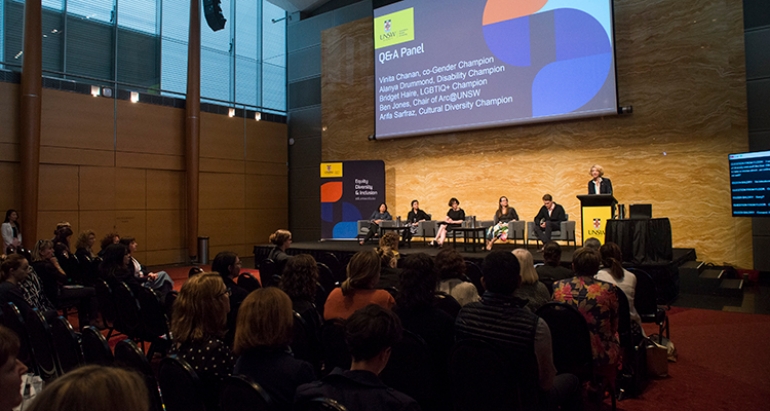“Embracing diversity and inclusion means providing everyone with equal access to opportunity,” says Professor Eileen Baldry.
UNSW’S inaugural Diversity Fest on from 23 – 27 September uplifted voices from a range of backgrounds, giving people the opportunity to speak their truth, as well as learn about and celebrate the value of diversity in our society. The week provoked bold conversations on how we can be more inclusive at UNSW and beyond. Positive reception from students, staff and wider community means the week-long festival has been marked on the UNSW events calendar for 2020.
There was a wide variety of events held during the week including social gatherings, art exhibitions, debates and panel discussions. The conversations covered topics across the full spectrum of diversity including age, gender, disability, cultural diversity and LGBTIQ+ inclusion.
The Division of Equity Diversity & Inclusion’s (EDI) Town Hall event, hosted by the Division’s Deputy Vice-Chancellor, Professor Eileen Baldry, unveiled the big impact the young division has achieved, and highlighted the initiatives and training opportunities in which students and staff can get involved.
“Embracing diversity and inclusion means providing everyone with equal access to opportunity. Yet, we can only foster this equitable environment if we all work together. I was delighted by the number of people who wanted to understand how they can be part of this exciting work of creating a more inclusive campus at UNSW,” Professor Baldry said.
An air of excitement filled the science, technology, engineering and mathematics (STEM) Women Profile Writing Lunch, as female doctoral students and early career researchers had the opportunity to have their professional photos taken and their LinkedIn profile and resume proofread by Alyce Taylor. The highlight for many participants was networking with fellow women in STEM and brainstorming strategies to achieve their career goals in a male-dominated sector.
"The Student Minds Conference and other Diversity Fest events have opened my eyes up to the wide array of people in society, their unique challenges and how I can be an Ally."
“In the field I’m in, Bio Medical Engineering, women are a minority. It’s really encouraging and motivating to network with a large group of women in STEM. I enjoyed that it was a comfortable, supportive environment, where we could discuss similar challenges,” said PhD student Lucy Ngo.
The Diversity Showcase invited high-profile EDI experts and UNSW alumni guest speakers to share their expertise and stories on diversity in the workplace. Financial consulting group Deloitte said it’s not about merely filling a quota; companies must foster a culture where diversity and inclusion are valued in every area of the business. The multinational media company, Canva, revealed the pervasive nature of unconscious bias. There was an audience engagement section in which images of people from diverse backgrounds were shown and the audience was asked to guess their professions.
“I was amazed to learn everyone was an Engineer. Most of us didn’t get this right because of our preconceived notion that people in specific professions will look a specific way,” said student Caroline Tran. This echoed the sentiments of sex workers who spoke at the Sex Worker Rights event organised by UNSW Women’s Collective. They said the industry is filled with people from a vast range of backgrounds and their profession should not be pigeonholed into one identity or stereotype.
Australian athletes candidly discussed issues surrounding gender, sexuality, disability and race in sports and the broader society at the Game Changers panel. Each athlete spoke of their perseverance through struggles and their willingness to harness their celebrity status to fight discrimination and inequality. A long line of star-struck fans stayed back after the panel for a chance to speak with their favourite athletes. A mother tearfully thanked Ellia Green and Sharni Layton for inspiring her daughters to be athletic and shed their fear of not being strong enough. “Because of both of you they persevered with their sports,” she said. A powerful reminder of why representation matters.
Eunsol Lee, a former Fine Arts student at UNSW, said Diversity Fest has transformed her perception of what diversity means. “Before Diversity Fest, my friends and I thought diversity was confined within race, culture, gender, sexuality or religion. We were surprised to learn it encompassed broader areas such as careers, flexible workplace arrangements and disability. My friends and I have now taken action to be more open-minded and understanding of people.”
"Diversity Fest has changed how I approach life. Exposing myself to a diverse range of perspectives really shifted my worldview."
The Student Minds Conference reverberated a key theme: it’s okay to not be okay in efforts to dismantle the stigma hindering conversations about mental illness. Students were introduced to resources and support services for people with mental illness. Experts from the LGBTIQ+ and Aboriginal & Torres Strait Islanders communities also revealed the additional challenges they faced in curbing the rise of mental illness.
“As an International Student from Korea I had very little understanding of the LGBTIQ+ community. The Student Minds Conference and other Diversity Fest events have opened my eyes up to the wide array of people in society, their unique challenges and how I can be an Ally,” said Jin Kim, UNSW student.
Diversity Fest highlighted the many ways being inclusive of diversity can positively enrich and add value to our society.
“Diversity Fest has changed how I approach life. Exposing myself to a diverse range of perspectives really shifted my worldview and showed me how important it is to welcome differences and ensure every person is included. This isn’t just the Division’s responsibility, it is everyone’s,” said John Duong, UNSW student.
